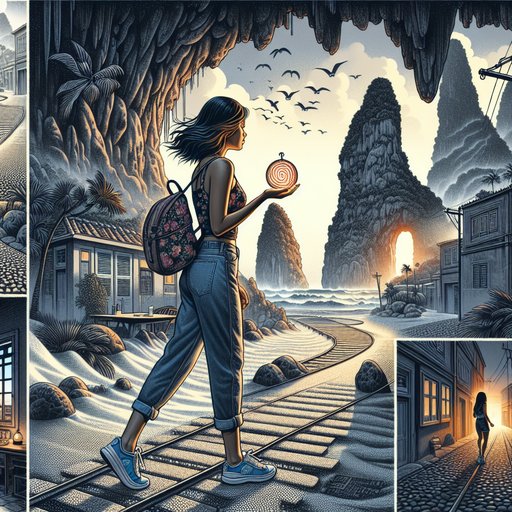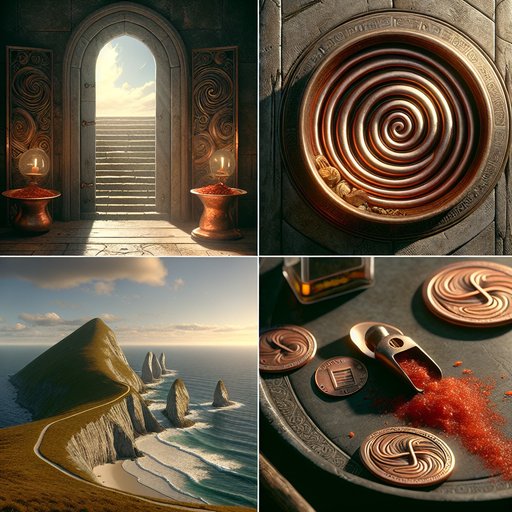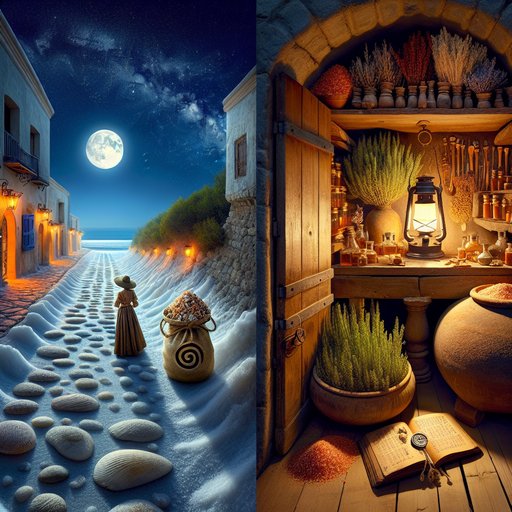CHAPTER 2 - The Whisper of the Salt Road

At dawn in Hadibo, Barbra Dender sets out for Hoq Cave, guided by a ledger scrap hinting at a “salt road” and a “singing cave.” Dressed in her tight jeans, blue and white Asics, a tank top, and a floral denim jacket, she follows the wind-scored trail into the limestone, alert to signs the island doesn’t share easily. Inside the cave, she finds her first tangible clue: a small copper token crusted with salt, etched with a spiral and three bars, and faintly scented with resin. Yet the token yields nothing she can read, and those who might explain—caravan men and the perfumer’s guarded family—refuse to help. Back in her rented room, she tries overlays and constellation guesses that go nowhere until someone places a spiral of dragon’s blood resin on her windowsill, proof she’s being watched. The clue remains opaque, trust withheld, and as Barbra steps into the night to chase a slipping shadow in the alley, the mystery deepens without offering her a way in.
At first light, Hadibo tasted of salt and citrus, the perfumer’s shop breathing out its perfumed fog as shutters creaked open. Barbra pulled on her tight jeans and blue-and-white Asics, smoothing the hem of her tank top under a faded floral denim jacket from her collection. She clipped a headlamp to her belt and stuffed a scarf and notebook into her pack, feeling that familiar mix of readiness and doubt. In the cracked mirror above the chipped basin she caught her reflection, freckles scattered like sand across her nose, and she disapproved of them the way she always did.
She hardly used makeup and didn’t need to, her grandparents had said, but the habit of disliking those tiny dots had burrowed in young and never really left. The perfumer’s wife watched her descend the narrow stairs, a ladle paused mid-air over a copper pot steeping resin tears. The man himself smiled without showing teeth, palms lightly dusted red, and asked if she would buy more frankincense later. “I’m going to Hoq Cave,” Barbra said gently, folding the ledger scrap until the word “salt” hid in a pleat.
The perfumer’s smile thinned into concern, and he murmured something about caves that sing to thieves and pilgrims alike. Barbra, raised to do for herself since four years old and sure-footed by practice, promised she would only listen. She took a shared pickup to the trailhead and began the long walk, the road crumbling into chalk and gravel where dragon’s blood trees leaned like red-topped serpents against the sky. Goats grazed around cairns that echoed constellations, their bells the only rhythm besides her breath, and the sun sharpened every edge of the limestone.
She moved with the fluid economy of her long walks, the slight muscle in her calves carrying her farther than she used to think possible. Salt glimmered in flats far below as if the sea had exhaled and left its lungs behind. “Salt road,” she said aloud, hoping saying the words would summon a path. The cave mouth yawned like a promise, a triangle of cool shadow beneath a scar of white cliff, and a breeze threaded through it with a low humming body.
Inside, the light fell away in steps, and Barbra’s headlamp flicked on, illuminating flowstone ribs slick as candle wax. The hum deepened to a long note that seemed to come from everywhere at once, metal and throat and stone, the kind of singing the island had warned her about. Stalactites shimmered above old inscriptions, names cut by sailors two millennia ago, languages scoured by time but stubbornly legible in places. She felt the pull of it, history thick as resin, and she kept her hands off everything but air.
Near a ledge where calcite had frozen a ripple of ancient water, something glinted in the dust, not stone but not new either. She knelt carefully and brushed away silt with the edge of her scarf, revealing a small copper token no bigger than a coin, crusted with white salt and the faint blush of redness that meant dragon’s blood resin had once kissed it. The design was simple: a spiral recessed into the metal and three parallel bars beneath, almost like a horizon beneath a storm. She rinsed it with a sip from her bottle, and the spiral darkened, a ring within a ring like a whirlpool.
When she pressed it to her nose, she swore she could smell resin, sweet and medicinal as a memory. This first real clue felt clean in her palm and yet maddening in her mind, a word in a language she didn’t speak. Barbra unfolded the ledger scrap and, by headlamp glow, tried to lay its jagged fragment over a section of wall where narrow drill marks dotted the limestone. Nothing aligned, and the phrase “salt road” remained stubbornly without direction, as if mocking the compass in her pack.
Somewhere deeper the wind caught a hidden mouth and made a higher note, a tune that lifted the tiny hairs at the back of her neck. She turned, suddenly sure someone watched her, sure enough to call out softly, “Hello?”
A thin boy stood at the edge of her light, not a ghost but nearly as quiet, his eyes enormous and astonished. He wore a striped scarf and carried a goat’s tether wrapped around his wrist, the animal nosing at the damp stones. The boy’s gaze dropped to the token in her palm, and his small mouth tightened; he shook his head once, decisively, and retreated two steps.
Barbra softened her voice, asked if he knew the spiral, if he had heard the cave singing today, if he would show her the salt road. He didn’t answer—only lifted a finger to his lips, then slipped into darkness the way only children and geckos can. She emerged blinking into a light that had mellowed toward late afternoon, the cliff face catching the sun like a fire held just shy of bright. Half a dozen men were pushing pack animals along the ridge, crates stamped with salt-lake marks lashed to wooden frames.
Barbra greeted them and walked beside them for a few minutes, the token warm in her pocket, the phrase “salt road” on her tongue the way a pebble rides a shoe. “Is there a road that sings?” she asked in Arabic, careful and respectful, and one of the older men laughed without warmth. “We do not speak of that road,” he said, and his companions’ silence was like a door shutting all at once. By the time she reached the perfumer’s doorway, daylight had frayed into gold threads and the shop was a deeper, sweeter room.
The perfumer’s wife stirred a steaming pot, and the man weighed beads of resin on an old scale, watching their pointer tremble between past and present. Barbra laid the ledger scrap on the counter and set the copper token beside it, and the room changed; the wife’s shoulders lifted with a breath she didn’t release, and the man’s eyes shuttered. “I found this where the cave sings,” Barbra said softly, but the perfumer only slid the token back with two fingers and shook his head. “Stories stick,” he said, voice polite as a blade, “and some belong to the island.”
Alone in her room above their lives, she placed the token on the table and sat with it the way she used to sit with the difficult things after her parents were gone.
Her grandparents had taught her patience as an act of love—stitching, saving, walking farther than anyone else wanted to—and that patience throbbed now like a muscle. She glanced at her freckled face again in the small mirror and wished she could rub the specks away as easily as she rubbed cave dust from her Asics. On a shelf she imagined her glass cabinet at home, rows of artifacts behind clean panes, each piece a promise kept to herself. The token did not deserve a place there yet; it hadn’t offered its story, and she would not force it.
She lit a lamp and began the work of overlays: tracing the spiral, drawing the three bars, laying them against the torn map of the ledger scrap as if they might consent to align. Outside, a low wind moved through the alley like a thoughtful animal, and someone laughed three doors down, then stopped. The lines refused to meet, the bars refused to become path, and the spiral spun only in place. Footsteps tapped on the stairs and paused outside her door, so light they might have been only a trick of old wood, then faded.
When she stepped to the window to cool her eyes, she saw it: a pinch of dragon’s blood resin on the sill, arranged in a small spiral that matched the token exactly. She was moving before she had decided to move, sliding into her jacket and down the narrow stairs past the perfumes of lemon and myrrh. The alley was a slit of shadow with a thread of sea-glow at its end, and the air tasted like a handful of salt tossed on the tongue. A figure turned that same instant beyond the doorway and let the night fold over them, leaving only the suggestion of a shoulder and the whisper of a sandal.
Barbra followed, careful as she could be on the uneven stones, feeling the city of Hadibo rearrange its walls around a stranger. The figure did not hurry, and then they were gone, like foam dissolving back into the line of the tide. She stood listening, and the night gave her sounds to sort: a distant radio, a goat’s sneeze, the breathy hum of wind in a pipe two roofs over that echoed the cave’s voice. The resin spiral on her windowsill meant she was not the only one tracing lines, and the people who could help had chosen their silence.
She cupped the token in one hand and the ledger scrap in the other, feeling both cool and stubborn against her skin. Somewhere, the salt road had to exist, and it had to start where the spiral uncoiled into a straight line. But who had left the red spiral for her to find, and what would they ask of her if she found them tonight?


































































